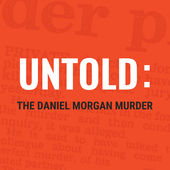Law Podcasts: a selection
Podcasts are a great way of keeping up to date with radio programmes about law, but they can also deliver a series of instalments of a longer, more detailed or complex narrative. They’re easy to download and store on a smartphone or other device, using one of the dedicated apps. (I use the Podcasts app… Continue reading about Law Podcasts: a selection
Podcasts are a great way of keeping up to date with radio programmes about law, but they can also deliver a series of instalments of a longer, more detailed or complex narrative. They’re easy to download and store on a smartphone or other device, using one of the dedicated apps. (I use the Podcasts app on iOS.) This post discusses some of the podcasts on law or crime that I’ve followed over the last couple of years and would recommend to potential listeners.
Current awareness podcasts
Law in Action
 Currently presented by Joshua Rozenberg (pictured), Law in Action is the BBC’s flagship legal affairs programme on Radio 4. The programme has been running since 1984 but it only makes 12 programmes a year, divided into three seasons of four episodes each, usually in March, June and November. Almost everyone who listens regularly would like there to be more of it, but Joshua is a busy man and a commentator much in demand, so we must be grateful for what the BBC can give us!
Currently presented by Joshua Rozenberg (pictured), Law in Action is the BBC’s flagship legal affairs programme on Radio 4. The programme has been running since 1984 but it only makes 12 programmes a year, divided into three seasons of four episodes each, usually in March, June and November. Almost everyone who listens regularly would like there to be more of it, but Joshua is a busy man and a commentator much in demand, so we must be grateful for what the BBC can give us!
The most recent series, in June 2016, covered topics including the difference between genocide and crimes against humanity, artificial intelligence and the law, coercive and controlling behaviour (very much in the news currently thanks to its appearance in the storyline of that other long-running BBC Radio 4 stalwart, The Archers) and the legal minefield around Brexit. Each programme has a headline topic but most also cover two or three other issues, including interviews with those affected and with experts or academics to discuss the issues. Sometimes they will take the form of a panel discussion, chaired by Joshua.
You can see and retrieve a list of recent episodes via the BBC.
You can subscribe via iTunes here.
The Law Report
 This is the Australian equivalent to Law in Action, presented by Damien Carrick, and broadcast on ABC radio. Damien’s presentation is a bit more relaxed and breezy than Joshua’s judiciously measured delivery, but the quality of the commentary and interviews is just as high and the programmes are much more frequent than Law in Action (weekly throughout the year) which means they can cover a lot more ground, including important legal developments from overseas. Damien has recently been replaced (I don’t know if this is permanent) by Rachel Carbonell.
This is the Australian equivalent to Law in Action, presented by Damien Carrick, and broadcast on ABC radio. Damien’s presentation is a bit more relaxed and breezy than Joshua’s judiciously measured delivery, but the quality of the commentary and interviews is just as high and the programmes are much more frequent than Law in Action (weekly throughout the year) which means they can cover a lot more ground, including important legal developments from overseas. Damien has recently been replaced (I don’t know if this is permanent) by Rachel Carbonell.
The varied topics covered recently include the use of algorithms in profiling the risk of reoffending when sentencing, as used in some American states, the consequences of dodgy migration advisers for the many who wish to emigrate to Australia, the development of an online divorce mediation facility in the Netherlands, and the success of an app that helps rebel groups in Syria learn and apply the laws of warfare.
As you might expect, given the cousinship of our common law legal systems, many of the issues discussed in The Law Report will often arise in English courts as much as those of Australia, particularly in the area of criminal law. However, the programme also highlights the occasionally stark differences between the laws or procedures of individual states within the Commonwealth of Australia, for example on whether the right to jury trial includes a right to opt for judge-only trial.
Sometimes the gap is between Australian law and that of England and Wales, as shown in a recent broadcast on the Australian High Court’s consideration of the extended joint enterprise rule in criminal law, which differed from the recent decision on a similar issue by our own top court, the UK Supreme Court, in the Jogee case [2016] UKSC 8; [2016] 2 WLR 681; [2016] WLR (D) 84.
You can subscribe via iTunes here.
Longer narratives
 Untold: The Daniel Morgan Murder
Untold: The Daniel Morgan Murder
Daniel Morgan was a private detective who was brutally murdered in a pub car park in South East London back in 1987. In the ensuing three decades it has become the most examined murder in British history, with five failed police investigations and an ongoing panel inquiry. Although suspects have been pointed at and motives discussed, the matter remains unsolved. There have been trials, but they have collapsed, and no definitive verdicts have been arrived at.
Untold’s scriptwriter and narrator, Peter Jukes, has worked with Daniel’s brother Alistair Morgan and other members of his family, and various witnesses and officers who’ve been involved over the years. The background, history and evidential material is artfully arranged into a true-crime narrative that is not only compelling as a whodunnit but also deeply disturbing for what it seems to reveal about the complicity of the tabloid media in police corruption.
Jukes believes it is this “criminal media nexus” that may well explain the motive for Daniel’s murder. There is evidence that he had discovered, and was about to sell to the press, a bombshell story about bent coppers. Officers who seemed to be helping the murder inquiry turn out later to have been, perhaps deliberately, taking it up a blind alley, scattering false clues and throwing other investigators off the scent. Alistair, who spent much of his life investigating his brother’s murder, believes the truth is out there, but there are powerful forces in whose interests it must remain obscured. Jukes, who recently wrote a book and a play about the phone-hacking trial (which he pioneeringly covered by daily live tweeting), is clearly convinced there is more to the media’s involvement than has yet been revealed. Whether or not you buy into the whole conspiracy idea, or are content to accept that in this case one cockup was followed not just by another but by a whole series of others, is up to you. But either way it makes for compelling listening.
You can hear all the episodes via the Untold website
Or you can download via iTunes here.
Serial: Season One
 This groundbreaking podcast, from the creators of This American Life on WBEZ radio, investigates the arrest, trial and imprisonment of Adnan Syed for the murder of his former girlfriend, Hae Min Lee, a fellow pupil at their high school in Baltimore, in 1999. Adnan claims to be innocent and seeks to overturn his conviction.
This groundbreaking podcast, from the creators of This American Life on WBEZ radio, investigates the arrest, trial and imprisonment of Adnan Syed for the murder of his former girlfriend, Hae Min Lee, a fellow pupil at their high school in Baltimore, in 1999. Adnan claims to be innocent and seeks to overturn his conviction.
The 12 initial episodes explore topics such as his alibi for the afternoon in question, the evidence against him, the alleged motive, the credibility of the chief prosecution witness, the discovery of the body, the use of mobile phone location tracking evidence to track people’s movements, the conduct of the defence by Adnan’s attorney (later disbarred) and the involvement of an innocence project in reinvestigating the matter for a possible appeal.
The narration and main investigation is conduct by Sarah Koenig (pictured), who speaks to Adnan in prison, as well as the many others whose interviews are included in the story. A huge number of documents has been collected and many of them can be viewed on the Serial website (click on the individual episodes to read more of the material from that episode).
Season One of Serial begins after a judge has refused Adnan Syed’s initial application, after a wait of three years. The series, first broadcast in 2014, generated enormous interest and in its wake a second application was made to the same judge. In June 2016 the judge relented and ordered a new trial. The new hearing and its result is discussed in the three further episodes of a Season One Update.
Season Two deals with a different case: an American soldier who was held for five years by the Taliban, and then charged with desertion. I haven’t heard it yet so can’t comment on it.
Also of interest
 Page 94: The Private Eye Podcast – Episode 13
Page 94: The Private Eye Podcast – Episode 13
The satirical magazine Private Eye is as well known for its investigative journalism as it is for its cleverly captioned cover images and the satirical parodies and cartoons that fill its middle pages. Stories trumpeted in the mainstream media (MSM) as exclusives or daring exposés have often appeared first in Private Eye. And given its willingness not merely to ridicule the vanity but also to expose the corruption and hypocrisy of the establishment, it is not surprising that it is quite often sued. How does it deal with such claims?
Episode 13 of the Eye’s very own podcast, presented by Andrew Hunter Murray, goes behind the scenes for an interview with “Robin”, the magazine’s in-house lawyer, in a discussion with editor Ian Hislop (who is about to celebrate 30 years in the post) about the big cases the Eye has been involved in over the years (many of them involving the firm of Peter Carter-Ruck and Partners acting on the other side).
You can subscribe via iTunes here.
Or listen via the website on what it calls the EyePlayer .
Private Eye puts very little of its content up online for free, thus ensuring that it maintains its extremely healthy print circulation levels. The Page 94 podcast, which discusses various aspects of the Eye’s coverage and the background to some of its stories, is therefore a rare chance to get something for nothing out of the Eye.
Reviewed by Paul Magrath, Head of Product Development and Online Content for ICLR
Comments welcome via Twitter: @maggotlaw. @TheICLR.